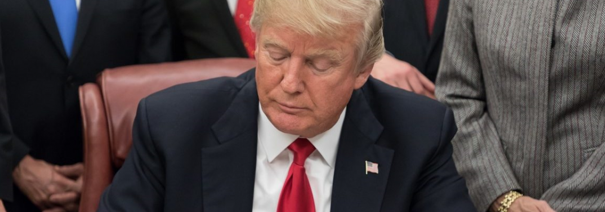
Mark Trahant / Indian Country Today
Congress did its job: The federal government’s budget is done. The last step was President Donald J. Trump’s signature and so now the government marches on. At least for the rest of this year, until the end of September.
But the White House said Friday that the president may veto the budget because there is not enough funding for a border wall or a solution for the so-called Dreamers. This is after the president assured House and Senate leaders that he would sign the measure into law.

A veto would mean the federal government would shut down at midnight and Congress would have to start a new round of budget negotiations. This will be even more complicated because many lawmakers have left Washington for a two-week recess.
There will be intense pressure from some Republicans for the president to sign this budget into law anyway.
Budgets are a guide to priorities: What programs are more important? Where is the support from Congress and from the people? Did the president get what he wanted?<p<>br>
That last question is the easy one. The money for the budget wall was minimal, at best.
It’s fair to say the administration’s budget was soundly rejected by a Republican Congress. Sure, Democrats contributed a great deal to this budget (and Democrat votes were required to make it so,) but even before that occurred, majority-party lawmakers were dismissing the harsh budget program changes sought by the president.
The president’s team had all kinds of ideas: Deep spending cuts, the elimination of public broadcasting, replace Medicaid with block grants, and, yes, even deeper spending cuts. Yet Congress enacted a budget that increased federal spending both for the military and domestic programs. It’s Congress, not the president, writing the checks.
How bad was the president’s budget? The National Congress of American Indians put it this way in recent testimony: “The president’s budget would cut the Bureau of Indian Affairs by about half a billion dollars, or 15 percent. BIA Social Services would be reduced by more than a third, Indian Child Welfare by more than a quarter, and critical human services programs, law enforcement and courts programs, environmental protection, housing, and education programs would face unconscionable reductions. Infrastructure programs, such as the Indian Community Development Block Grant would be eliminated, and the Indian Housing Block Grant and road maintenance would be reduced.”
Instead, Congress added dollars and protected programs that the White House sought to eliminate.
“This bill represents real progress for Indian Country, significantly increasing our investments in Native health care, infrastructure, economies, and communities. It rejects the president’s dangerous proposed budget cuts and instead provides funding increases that will lead to healthier communities and better outcomes across Indian Country,” said Sen. Tom Udall, D-New Mexico, in a news release. Udall is vice chairman of the Senate Committee on Indian Affairs and ranking member of the Appropriations Subcommittee on Interior, Environment, and Related Agencies.
The omnibus spending bill would have increased funding for the Indian Health Service by 10 percent, and the Bureau of Indian Affairs and Bureau of Indian Education by 7 percent to $3.064 billion. The IHS budget line s $5.5 billion.
Conservatives were not happy with the additional spending in the omnibus bill. “Republicans control the government, yet Congress still follows the Democrats’ playbook,” Sen. Rand Paul, R-Kentucky said. “Time and again, spending skyrockets, and conservatives are expected to fall in line to praise the party for making the big-spending status quo worse.”
However Rep. Tom Cole, R-Oklahoma, a member of the House’s leadership team praised the legislation. “Despite divisions, both sides of the aisle have the responsibility to deliver this legislation for the American people so that the federal government runs efficiently and effectively,” Cole said. “Neither side got everything it wanted, but the end product reflects a broadly supported compromise. A majority of Republicans and Democrats voted for this bill. President Trump urged its passage and has promised to sign this legislation. As we begin to consider funding for Fiscal Year 2019, it is imperative that Congress remain committed to the return to regular order in the appropriations process.”
The president will decide in the next few hours whether or not he got enough of what he wanted.
(The National Congress of American Indians is the owner of Indian Country Today and manages its business operations. The Indian Country Today editorial team operates independently as a digital journalism enterprise.)
Mark Trahant is editor of Indian Country Today. He is a member of the Shoshone-Bannock Tribes. Follow him on Twitter @TrahantReports (Crossposted on Trahant Reports.)

